Baseball is a team sport in which a player on one team (the pitcher) attempts to throw a hard, fist-sized ball past a player on the other team (the batter), who attempts to hit the baseball with a tapered, smooth cylinder called a bat. A team scores only when batting, by advancing past a series of four markers called bases arranged at the corners of a square. Baseball is sometimes called hardball to differentiate it from similar games such as softball.

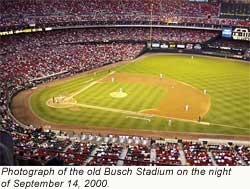 Baseball is most popular in the Americas and East Asia. In Japan, Puerto Rico, the Dominican Republic, Cuba, Panama, Venezuela, South Korea, and Taiwan, it is one of the most popular sports. In the United States (the birthplace of baseball), baseball has long been regarded as more than just a "major sport" - it is the national pastime and Major League Baseball has been given a unique monopoly status by the U.S. Congress; the total attendance for Major League games is roughly equal to that of all other American professional team sports combined. Among American television viewers, however, baseball has been surpassed in popularity (in terms of television ratings) by American football. Although three of the four most popular sports in North America are ball games (baseball, basketball and American football), baseball's popularity grew so great that the word "ballgame" in the United States almost always refers to a game of baseball, and "ballpark" to a baseball field. Baseball is most popular in the Americas and East Asia. In Japan, Puerto Rico, the Dominican Republic, Cuba, Panama, Venezuela, South Korea, and Taiwan, it is one of the most popular sports. In the United States (the birthplace of baseball), baseball has long been regarded as more than just a "major sport" - it is the national pastime and Major League Baseball has been given a unique monopoly status by the U.S. Congress; the total attendance for Major League games is roughly equal to that of all other American professional team sports combined. Among American television viewers, however, baseball has been surpassed in popularity (in terms of television ratings) by American football. Although three of the four most popular sports in North America are ball games (baseball, basketball and American football), baseball's popularity grew so great that the word "ballgame" in the United States almost always refers to a game of baseball, and "ballpark" to a baseball field.

Baseball is among the oldest and most popular team sports in the United States. A unique culture surrounds it, which includes the game itself, the field, the players, the ballparks, and the fans. It remains a sport created in and for simpler times, yet is a complex sport that is greater than any one individual, team, or era. Baseball is a perennial attraction—summarized below in Baseball's unique style—unlike any other mainstream, American sport. Many people believe that baseball is the ultimate combination of skill, timing, athleticism, and strategy. Yogi Berra (a Hall of Fame baseball player) once said: "Baseball is 90% mental—the other half is physical."
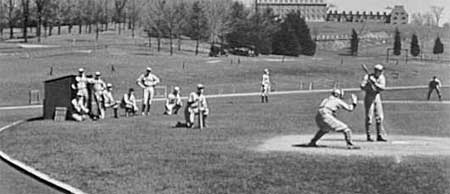
As far back as the 1870s, American newspapers were referring to baseball as "The National Pastime" or "The National Game." A substantial part of baseball's appeal is that most of the games take place during the warm, relatively leisurely months of the year, which is why many people refer to baseball players as "The Boys of Summer."
Although the origins and evolution of the various bat-and-ball games are murky, baseball is primarily an American invention. However, some believe that it originated as an adaptation of the game of rounders, and was also influenced by the rules of cricket. Baseball is thought to be a direct descendant of cricket, rounders, and town ball (which was much like rounders). The first explicit references to baseball appear to come from England. The earliest known mention of the sport is in a 1744 publication, A Little Pretty Pocket-Book by John Newbery. It contains a wood-cut illustration of boys playing "baseball" (showing a similar set-up to the modern game) and a rhymed description of the sport. Also, a British letter dating from 1748 by Lady Hervey describes how the then Prince of Wales diverted his time playing baseball.
Another early mention of the game can be found in an 1886 edition of Sporting Life magazine, in a letter from Dr. Adam Ford of Denver, Colorado, formerly of St. Marys, Ontario, Canada, who details a baseball game played in Beachville, Ontario, Canada, on June 4, 1838 -- Militia Muster Day.
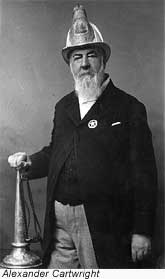 Alexander Cartwright had a hand in compiling and publishing an early list of rules in 1845 (the so-called Knickerbocker Rules) to meet the demands of the already popular sport, and today's rules of baseball have evolved from them. Alexander Cartwright had a hand in compiling and publishing an early list of rules in 1845 (the so-called Knickerbocker Rules) to meet the demands of the already popular sport, and today's rules of baseball have evolved from them.
Professional baseball began in the United States around 1865, and the National League was founded in 1876 as the first true major league, quickly producing famous players such as Honus Wagner. Several other major leagues formed and failed, but the American League, established in 1901 as a major league and originating from the minor Western League (1893), did succeed. While the two leagues were rivals who actively fought for the best players, often disregarding one another's contracts and engaging in bitter legal disputes, a modicum of peace was established in 1903, they began playing a World Series that year.
Compared to modern times, games in the early part of the 20th century were lower scoring and pitchers were more successful. The "inside game", whose nature was to "scratch for runs", was played rather more violently and aggressively than it is today. Ty Cobb said of his era especially, "Baseball is a war!" This period, which has since become known as the "dead-ball era", ended in the 1920s with several rule changes that gave advantages to hitters and the rise of the legendary baseball player Babe Ruth, who showed the world what power hitting could produce and thus changed the nature of the game.

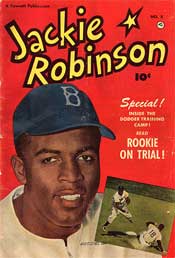 During the first half of the 20th century, a "gentlemen's agreement" in the form of the baseball color line effectively barred African-American players from the major leagues (though not Native Americans, oddly enough), resulting in the formation of several Negro Leagues. Finally in 1947, Major League Baseball's color barrier was broken when Jackie Robinson was signed by the National League's Brooklyn Dodgers. Although it was not instantaneous, baseball has since become fully integrated. During the first half of the 20th century, a "gentlemen's agreement" in the form of the baseball color line effectively barred African-American players from the major leagues (though not Native Americans, oddly enough), resulting in the formation of several Negro Leagues. Finally in 1947, Major League Baseball's color barrier was broken when Jackie Robinson was signed by the National League's Brooklyn Dodgers. Although it was not instantaneous, baseball has since become fully integrated.
Baseball has often been a barometer of the fabled American "melting pot", as immigrants from different regions have tried to "make good" in various areas including sports. In the 19th century, baseball was populated with many players of Irish or German extraction. A number of Native Americans had successful careers especially in the early 1900s. Italians and Poles appeared on many rosters during the 1920s and 1930s. Black Americans came on strong starting in the late 1940s after the barriers had been lifted, and continue to form a significant contingent. By the 1960s, Hispanics had started to make the scene, and had become a dominant force by the 1990s. In the 21st century, East Asians have been appearing in increasing numbers.
The middle of the century led major league baseball to the West of the United States and also became a time when pitchers dominated. Scoring became so low in the American League, due to pitching dominance, that the designated hitter was introduced; this rule now constitutes the primary difference between the two leagues.

Despite the popularity of baseball, and the attendant high salaries relative to those of average Americans, the players have become unsatisfied from time to time, as they believed the owners had too much control—a stance that many baseball fans found objectionable. Various job actions have occurred throughout the game's history. Players on specific teams occasionally attempted strikes, but usually came back when their 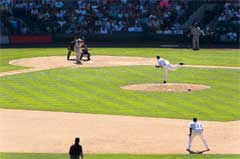 jobs were sufficiently threatened. The throwing of the 1919 World Series, the "Black Sox scandal", was in some sense a "strike" or at least a rebellion by the ballplayers against a perceived stingy owner. But the strict rules of baseball contracts tended to generally keep the players "in line". jobs were sufficiently threatened. The throwing of the 1919 World Series, the "Black Sox scandal", was in some sense a "strike" or at least a rebellion by the ballplayers against a perceived stingy owner. But the strict rules of baseball contracts tended to generally keep the players "in line".
This began to change in the 1960s when former Steelworkers Union president Marvin Miller became the Baseball Players Union president. The union became much stronger than it had been previously, especially when the reserve clause was effectively nullified in the mid-1970s. A series of strikes and lockouts began in baseball, affecting portions of the 1972 and 1981 seasons and culminating in the infamous strike of 1994 that led to the cancellation of the World Series and carried over into 1995 before it was finally settled.
The players typically always got what they demanded, but the popularity of baseball diminished greatly as a result of the players' actions, and fans were slow to return. Cal Ripken's record-breaking 2131st consecutive game in 1995 was a feel-good moment that helped boost interest in the sport. The great home run race of 1998 between Mark McGwire and Sammy Sosa really turned things around, captivating fans all summer. As with other times when adversity threatened the game, positive on-field events had triggered a renewed surge in baseball's popularity in America.

Professional baseball leagues began to form in countries outside of America in the 1920s and 1930s, including the Netherlands (formed in 1922), Japan (1936), and Australia (1934). Today, Venezuela (1945), the whole of Europe (1953), Italy (1948), Korea (1982), Taiwan (1990), and mainland China (2003) all have professional leagues as well. Canada has a franchise in Major League Baseball as well. Competition between national teams, such as in the World Cup of Baseball and the Olympic baseball tournament, has been administered by the International Baseball Federation since its formation in 1938. As of 2004, this organization has 112 member countries. The new World Baseball Classic, held in 2006, seems likely to have a much higher profile than previous tournaments, owing to the participation for the first time of a significant number of players from the United States Major Leagues.
The 117th meeting of the International Olympic Committee, held in Singapore in July 2005, voted not to hold baseball and softball tournaments at the 2012 Summer Olympic Games, but they will remain an Olympic sport during the 2008 Summer Olympic Games, and will be put to vote again for each succeeding Summer Olympics. The elimination of baseball and softball from the 2012 Olympic program enabled the IOC to consider adding two other sports to the program instead, but no other sport received a majority of votes favoring its inclusion.
|